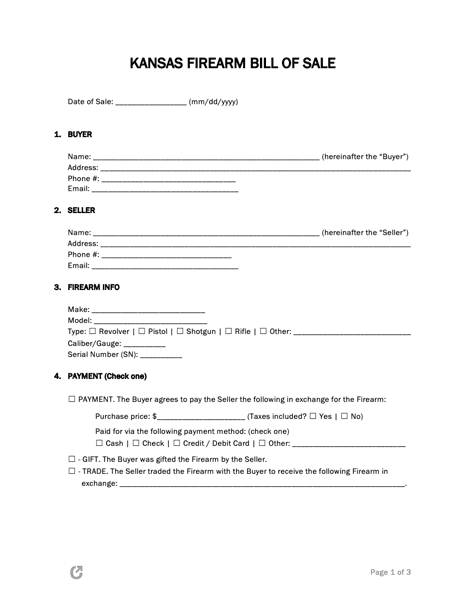Kansas Firearm Bill of Sale Form
A Kansas firearm bill of sale form conveys the transfer of a deadly weapon between two (2) private parties. It provides written proof that the seller legally owns the gun and deemed the buyer fit to purchase it. Neither person can have a criminal record or history of addiction, domestic abuse, or misdemeanors. Kansas does not require private sales to include a background check or permit to purchase. However, the owner can request the potential buyer undergo screening and/or present a state-issued license.
|
What is a Kansas Gun Bill of Sale?
A Kansas gun bill of sale provides definitive proof of a buyer and seller’s deal. Both parties must provide information about the firearm, including its make, model, type, caliber/gauge, and serial number. The payment section should list the transfer method (i.e., cash, trade, or gift) and the purchase price.
A buyer’s signature indicates their agreement to pay the seller the total amount. The form makes them responsible for meeting the terms therein. If they fail to abide by the conditions, the seller can use the document to hold them legally accountable. In these situations, the form holds greater weight if it has a notary seal or a witness’ signature.
How to Apply for a Handgun License
Lawful residents twenty-one (21) years of age or older do not need a concealed carry handgun license (CCHL) to concealed carry in Kansas. Individuals between eighteen (18) and twenty (20) can only concealed carry with a permit.
County offices still offer CCHLs to gun holders who legally wish to carry in another state. The license also exempts customers from undergoing a background check when purchasing a firearm through a licensed dealer.
Residents must apply at their nearest county sheriff’s office. The application packet goes to the attorney general, who approves or denies it based on the provided information.
Step 1 – Qualifications
Applicants must meet the requirements before sending in the information. By reviewing the protocol ahead of time, individuals can save time and resources while preventing a rejected application.
The person applying for the CCHL must:
- Be a Kansas resident;
- Not have state or federal mandated restrictions for shipping, transporting, owning, or receiving a firearm;
- Be eighteen (18) years of age or older (provisional license);
- Be twenty-one (21) years of age or older (standard license);
- Pass an eight (8) hour handgun safety and training course; and
- Pay the fees associated with the firearm education class.
Step 2 – Firearm Safety Course
If the person applying has not taken a firearm safety course, they must do so before sending the information to their county sheriff. They must choose a certified instructor to determine where and how they plan to take the eight (8) hour course. Once they pass the training, the instructor must provide them with a certificate of completion. The student must include the certificate in their application packet (K.S.A. 75-7c04).
Step 3 – Gather Documentation
The applicant must collect the necessary paperwork before visiting their county sheriff’s office. Preparing increases the chances of approval by ensuring the individual sends the correct information.
Per state law, the individual must have a passport-sized (two (2) inches by two (2) inches) photograph taken of them within thirty (30) days of applying. The picture must include their head and shoulders without sunglasses or hats. Applicants must obtain a physical copy of the image and attach it to the submission packet.
Kansas requires the person applying to make a copy of their driver’s license or state identification card and send it. Individuals born in another county must provide additional documentation proving U.S. citizenship.
The applicant must review the Kansas Personal and Family Protection Act (KPFPA) before the appointment (K.S.A. 75-7c01). In addition, they must bring a form of acceptable payment to cover the $132.50 fee.
Step 4 – County Sheriff’s Office
The applicant must bring the required forms to the county sheriff’s office on the day of the appointment. The staff takes the individual’s fingerprints and collects the necessary information. Then, they send the packet to the attorney general for approval.
Provide the Following:
|
Step 5 – Pick Up License
The attorney general has up to ninety (90) days by law to provide the applicant with an approval or denial notice (K.S.A. 75-7c05(e)). However, a response usually comes in about sixty (60) days.
Applicants must pick up their permit at the closest Kansas Department of Revenue (DOR) driver’s license station. At that time, the DOR staff takes the licensed individual’s photo and collects payment. The office issues a temporary paper version of the CCHL, then sends a hard copy by mail within forty-five (45) days.
Step 6 – Renew
Kansas CCHLs last for four (4) years. The applicant receives a yellow renewal application by mail three (3) to four (4) months before expiration. However, individuals can renew up to six (6) months prior.
Residents who have not received a mail notice two (2) months before the license expires should contact the Concealed Carry Licensing Unit (CCLU) at (785) 291-3765.
The state only allows in-person and mail renewals, meaning the license holder cannot reapply online or electronically. Only the Topeka location can issue CCHL renewal licenses. Per state law, renewals do not require the individual to undergo fingerprinting, photographing, or training classes.
Residents who fail to renew on time pay an additional $15 fee. If they do not send in the information six (6) months after the expiration, they must apply again as new applicants.
| Mailing Address: |
| Kansas Attorney General Concealed Carry Licensing Unit 120 SW 10th Ave, 2nd Fl. Topeka, KS 66612-1597 |
